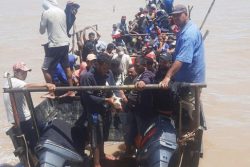Dear Editor,
The Indigenous population of Guyana is currently around eighty thousand and growing from nine different nations in the country’s interior. Despite representing a third of the country’s population, our communities have historically faced challenges in acquiring land demarcation and accessing proper education, healthcare, and other essential services the state provides because of various reasons. These challenges stemmed from our right as citizens to have outside assistance, which helped us integrate and assist in the nation’s development. However, in recent years, central governments have been working hard to bring these amenities to our villages, aiming not to neglect us as before but to provide equal opportunities for improvement in our communities.
The current administration is providing essential
services such as healthcare and education. It has also been building schools in remote areas to ensure Indigenous peoples have access to meritocratic learning and higher education. Although these investments in education are commendable, more effort is needed to enable our young people to become professionals and contribute to the sustainable development of the interior. Nonetheless, our people are grateful for the government’s assistance in cash grants and support to our schools but most believe that public funds should be invested in other significant projects as well.
This is where our people should meet the government halfway helping them to engage communities through the process of Free Prior and Informed Consent (FPIC) so that we can be on equal footing on the plan of development appropriate to us. Where carbon revenues can be spent on modern services such as Wi-Fi, running water at homes, and more decent paved roads to market our farm products and maintain a healthy lifestyle eating organic products and less use of plastic in communities. Other areas for more investments can be in sports, agriculture, business, health, cultural preservation, science, and technology. For example, establishing well-equipped community libraries with reliable internet services can support research on diverse fields of knowledge to pursue higher education to foster academic and vocational learning for young people, including how to create ‘cooperatives’ which can evolve into the banking and investing of revenues from carbon and other sources of income for our population and the nation. When these are achieved there will be fewer Community Field Officers (CFOs) dependent on temporary jobs in villages working and earning better jobs.
Temporary or slapdash investments are not sustainable for the development of communities because it does not empower people to use their skills and talents. They become victims of living from hand to mouth just like mining. This activity caused much damage to our culture and ecology. Many of our young people frequent the mines to get quick cash, however, they must be conscious of the destruction of the forest, rivers and soil caused by this activity. The use of mercury is harmful to the environment and humans since the substance seeps into surface water which we, animals and birds consume for our survival. We must learn from the native American proverb “It’s only when the last tree is cut and the last river is poisoned, that we will realize we cannot eat money”. Hence, there is a need for our people to continue taking care of the rivers, wild animals, land, creeks, and forests that sustain us and contribute to the green development of the country.
Our people must also learn to adapt to the changes occurring with the entry of technology that is transforming our lives, particularly the young generation, to know how to use gadgets wisely for success in enhancing their education, culture and traditions and not allow them to replace family, collective efforts and outdoor activities. The Indigenous man or woman must continue to know how to fish and hunt and toil harder to earn more cash to pay bills and also be technologically savvy in contemporary Amerindian communities across Guyana.
As Indigenous people, we must continue to be smart to deal with outside influences, be it economic, modernity, religion, or other strong forces. Our resilience which is rooted in cultural values, and unity and collectively empowered us over the years to dialogue with outside influences assisted us to find ways to sustain our worldview and Indigenous identity. These unique gifts must be fostered to further lobby for our lands to be demarcated so that we continue to be stewards of the forests and lands contributing to Guyana’s green economic blueprint and also dealing with social ills in communities.
Modern development should not only be centred on material comfort but emphasis must also be placed on addressing social issues like domestic and gender-based violence, broken homes, teenage pregnancies, excessive use of alcohol, incest, and other ills which plague our communities causing many families and children to suffer from trauma. There is a need for collective efforts to address these issues that spoil our ‘good life’ in communities. As such, church leaders, teachers, and villagers should mobilise to visit homes and hold regular workshops to educate people on these issues. This initiative can help Indigenous communities combat social ills and have fewer people suffering emotionally in communities. It can also serve to bring awareness to people’s craving for material comfort that they should pay attention to social ills reality in the hinterland.
Yours faithfully,
Medino Abraham
Researcher on Indigenous people in Guyana







